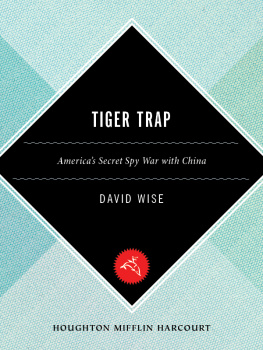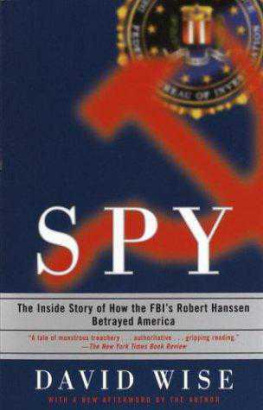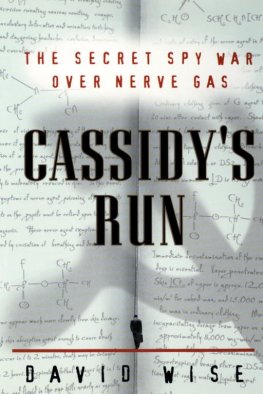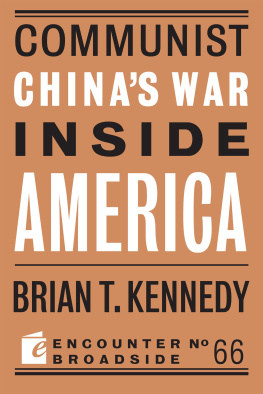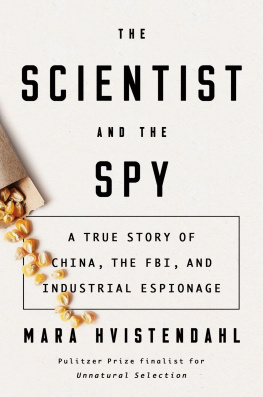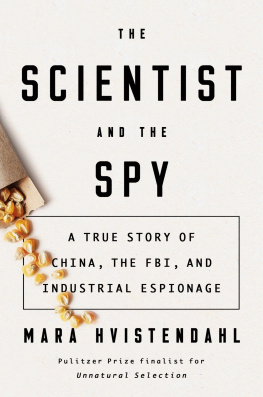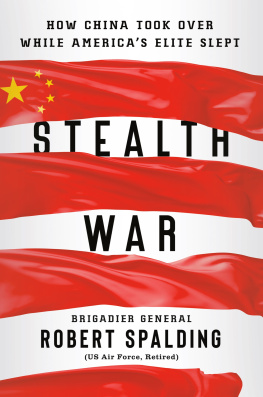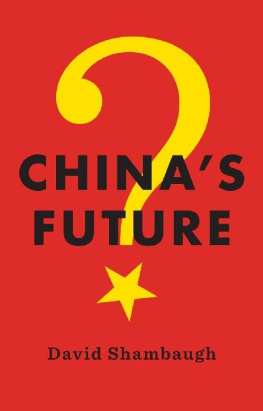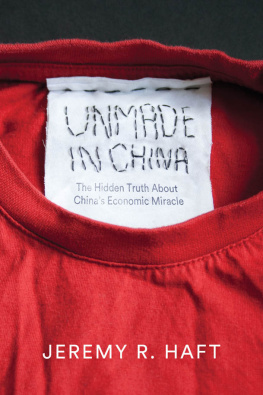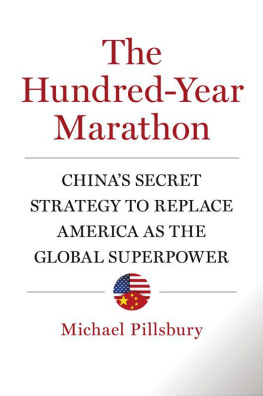Houghton Mifflin Harcourt
BOSTON NEW YORK
2011
Copyright 2011 by David Wise
ALL RIGHTS RESERVED
For information about permission to reproduce selections from this book,
write to Permissions, Houghton Mifflin Harcourt Publishing Company,
215 Park Avenue South, New York, New York 10003.
www.hmhbooks.com
Library of Congress Cataloging-in-Publication Data
Wise, David, date.
Tiger trap : America's secret spy war with China / David Wise.
p. cm.
Includes bibliographical references and index.
ISBN 978-0-547-55310-8
1. Espionage, ChineseUnited StatesHistory. 2. Intelligence service
ChinaHistory. 3. Intelligence serviceUnited StatesHistory.
4. United States. Federal Bureau of Investigation. I. Title.
UB 271. C 6 W 56 2011
327.51073dc22 2010042025
Book design by Brian Moore
Printed in the United States of America
DOC 10 9 8 7 6 5 4 3 2 1
To Natalie, Ambrose, and Ben
There are no walls which completely block the wind.
FROM A CHINESE GUIDE ON ESPIONAGE
A Thousand Grains of Sand
Parlor Maid
The Recruitment
Double Game
Destroy After Reading
"Holy Shit, Mr. Grove!"
Riding the Tiger: China and the Neutron Bomb
The Walk-in
Kindred Spirit: Wen Ho Lee
Sego Palm
Trouble in Paradise
Ethereal Throne: The Spy Who Never Was
Storm Clouds
The Counterspy
Royal Tourist
Richard Nixon and the Hong Kong Hostess
Anubis
Endgame
Eagle Claw
Red Flower
The Cyberspies
An Afterword
Author's Note
Notes
Prelude
Scene 1
November 1997.
Katrina Leung made a striking figure, standing there at the microphone in her brightly colored cheongsam Mandarin dress and jacket, her jet-black hair swept up in a tight bun as usual, the high cheekbones accenting her thin, angular face. She was joking with Jiang Zemin, the president of China, joshing and cajoling him to sing for the VIP audience of one thousand at the Biltmore Hotel in Los Angeles.
"I will sing a song from a Chinese opera," President Jiang finally agreed, to the delight of the assembled dignitaries.
"One silver moon over the window sill," he warbled in Mandarin, choosing an aria from The Capture and Release of Cao Cao, the classic tale of a conniving, murderous third-century warlord who is caught and sweet-talks his way out of trouble.
Katrina Leung, at the time a prominent member of the Chinese American community in Los Angeles, had organized the 1997 dinner in honor of Jiang and was acting as his interpreter and emcee of the affair, basking in the spotlight, where she liked to be. Leung's persuading the president of China to burst into song was the high point of the evening, and her coup created a major buzz in the room.
If there had been any doubt before, the night at the Biltmore solidified her position as the most powerful Chinese American personality in Los Angeles. Leung appeared to move easily at the top of the worlds of politics and business in both the United States and China. How she managed to do so confounded even her many admirers.
But there was something that the distinguished dinner guests did not know: Katrina Leung was a spy, code-named PARLOR MAID .
Scene 2
December 1990.
Bill Cleveland, chief of the Chinese counterintelligence squad in the FBI's San Francisco field office, was checking into the Zhongshan Hotel in Shenyang, in northeast China, when he saw him.
Dark-haired, cool, handsome enough to be a Hollywood actor, Cleveland was not someone easily rattled. But now he looked like a man who had seen a ghost.
He turned, crossed the hotel lobby, and spoke urgently to I. C. Smith, a fellow FBI agent. As Smith recalled the moment, Cleveland approached him looking "sort of wide eyed."
"You won't believe who I just ran into," Cleveland said. "It was Gwo-bao Min."
For more than a decade, Cleveland had relentlessly pursued Min, an engineer with a Q clearance who had worked at the Lawrence Livermore National Laboratory in California, one of two national laboratories in the United States that design nuclear weapons. Clevelandand the FBIwere convinced that Min had betrayed critical US nuclear secrets to China. Yet the proof, enough evidence to make an arrest, seemed always, maddeningly, just out of reach.
In the closed world of FBI counterintelligence, only a small group of insiders knew about the highly classified case and the lengthy pursuit of the former Livermore scientist. Min had become the great white whale to Cleveland's Captain Ahab. The FBI gave its TOP SECRET investigation a code name: TIGER TRAP .
Cleveland could not let go of the case; he had delivered dramatic closed lectures on TIGER TRAP at the lab, at the FBI training facility in Quantico, Virginia, even at CIA headquarters, using it as an illustration and a warning of subtle Chinese intelligence methods.
At the time of the unexpected encounter in Shenyang, Cleveland was the bureau's preeminent Chinese counterintelligence agent. For an FBI counterspy to get into China was tricky enough, but Cleveland, a Mandarin-speaking student of Chinese history, had managed it.
He had slipped into the Communist-controlled mainland as a member of a State Department team inspecting the security of US diplomatic installations in China. I. C. Smith, the other FBI agent on the team, was on assignment to the State Department and traveled as a diplomat. He recalled that they were closely watched. Well before the inspection team arrived in Shenyang, Smith thought he had detected an unusual amount of surveillance.
"In Beijing one day," he said, "it was late in the afternoon, a cold dry wind blowing, and I went into a park called the Temple of the Sun to stretch my legs." The park, near the American embassy, was deserted, but as he turned to go back he suddenly came upon a man who quickly looked away and began studying a mural nearby. Smith continued on a short distance, discreetly photographed the man, and kept walking. As he left the park he saw a black limousine, the motor running, with two Chinese men inside. He had no doubt that the car and its occupants were from the Ministry of State Security, the MSS, China's intelligence service.
"Later in a market, I saw a guy and the same guy kept showing up. We were even followed on a trip to see the Great Wall." Smith was surprised at all the attention. "Usually diplomatic security people don't get that kind of coverage."
And now, incredibly, Cleveland had run into Min, the target of the prolonged TIGER TRAP investigation, in remote Shenyang! Cleveland knew Min; he had questioned him more than once. The two spoke briefly in the hotel lobby. It turned out that both were scheduled to leave Shenyang on the same flight two days later, but Min never showed up at the airport.
Cleveland was shaken by their encounter in the hotel. In a country of more than a billion people, what were the odds of Bill Cleveland running into Gwo-bao Min?
"Neither one of us believed in coincidences," I. C. Smith recalled in his gumbo-thick Louisiana drawl. Was the MSS trying to rattle the FBI? Was the People's Republic of China sending a message from Shenyang to the J. Edgar Hoover Building in Washington?
Cleveland could not be sure. But as matters turned out, the encounter was a dark harbinger of what awaited him.
Chapter 1
A THOUSAND GRAINS OF SAND
F OR ALMOST HALF a century during the Cold War, the world focused on the global espionage battle between the United States and the Soviet Union. The duel between the CIA and the KGB, portrayed in countless books, films, and news stories, captured the public imagination.
Next page
